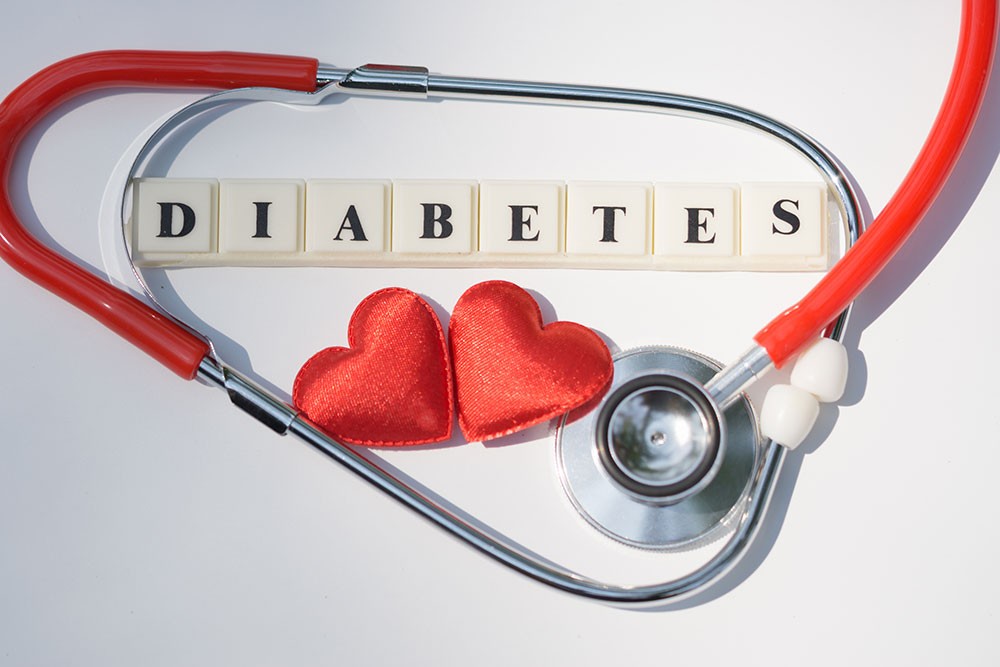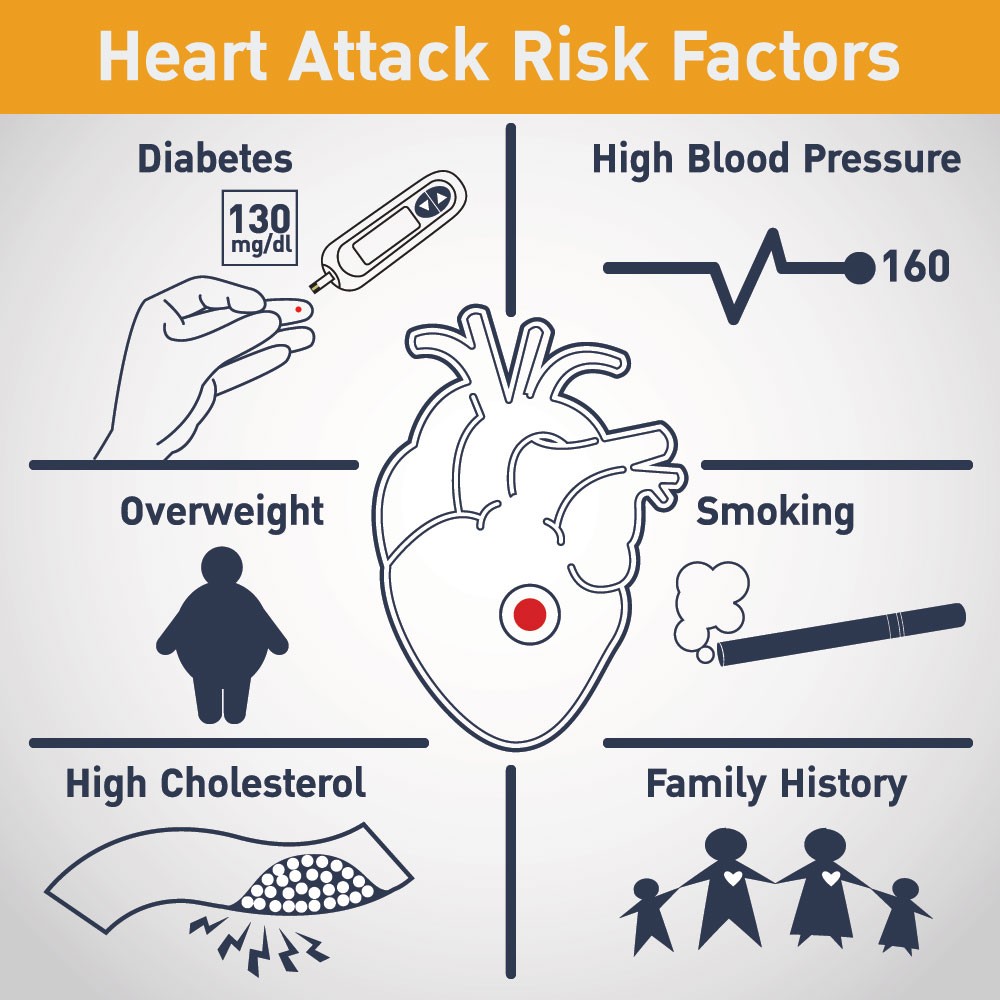Last updated on September 26th, 2022
Diabetes and heart disease are often developed simultaneously in a person. More than 90 per cent of people who suffer from diabetes get heart-related problems at some point or the other in their lives.
You, however, can manage diabetes and prevent heart-related complications if you make some simple lifestyle changes.
Heart problems have become a very common health problem among Indians, and most of the time, it causes serious trouble to the patient. In some cases, it also results in death. Being a diabetic patient, it is very common to have a heart-related disease or stroke.
Well, the patient can lower the risk of heart disease and boost their heart health by bringing some changes in their lifestyle habits. This enables you to efficiently manage your blood sugar levels, thus, cutting down the risk of heart-related problems.
Summary
Diabetes and heart diseases are two very closely knitted health issues. When a person develops diabetes, there is 90% chance that he/she is going to suffer from a heart-related ailment. To keep your heart safe, you have to make some lifestyle changes like having a healthy diet and indulging in physical activity on a daily basis.

Heart Disease
Heart disease includes many types of problems including stroke, cardiovascular problems and blood vessel diseases. One of the most common types of heart disease is coronary artery disease. In this type, the blood flow to the heart gets affected. A patient develops coronary artery disease when there is a lot of plaque stashed in the walls of the coronary arteries.


How Does Diabetes Affect Your Heart?
Diabetes or high blood sugar damages blood vessels that control the heart. Other conditions that raise the risk of heart disease are:
- High Blood Pressure (BP) increases the force of blood through arteries and damages artery walls. High diabetes and blood pressure increase the risk of heart diseases.
- When a lot of LDL (bad) cholesterol gets stashed in your bloodstream, it generates plaque on the damaged artery walls.
- High triglycerides and low HDL cholesterol or high LDL cholesterol contribute to the hardening of the arteries.
Notably, none of the above mentioned conditions gives you symptoms. Your medical practitioner will just have to check your blood pressure and ask you to undergo a simple blood test to see if your LDL, triglyceride and HDL levels are in which condition.
Below mentioned factors increase risk factors for heart diseases:
- Excessive Smoking
- Overweight or obesity
- Inactive lifestyle
- Consuming a diet that has rich quantities of saturated fat, cholesterol, trans fat and sodium (salt)
- Consuming excessive alcohol
Also Read: Best glucometer in India
Diabetic patients are more prone to have heart failure. Cardiac failure is a serious condition, in this condition, the person’s heart does not pump blood in the manner that it is supposed to be doing. Heart failure can lead to swelling in the legs and fluid building up in your lungs, making it tough to breathe. Heart failure may get worse over time, therefore, it is advised for early diagnosis and treatment as it can help in providing relief symptoms and delaying the condition from getting worse.
Summary
Diabetes or high blood sugar damages blood vessels that control the heart. Diabetes, combined with high blood pressure, damages your artery walls, thus, increasing the risk of heart related diseases. The risk of suffering from heart disease increases if you do excessive smoking, have extra weight, do not exercise, consume high saturated and trans fat foods, consume too much sodium (salt) and consume a lot of alcohol.
Symptoms of Heart Disease
Different people experience different types of symptoms of heart disease. The symptoms may also vary depending upon the severity of the condition. There are people who do not experience any symptoms. Mentioned here are some of the most common symptoms experienced in most of the patients:
- A patient may experience unusual pressure, pain or tightness in his/her chest. The pain usually occurs behind the breastbone and can go on to your back, arms and neck.
- Shortness of breath is also a very common symptom
- The patient may feel fatigued all the times
- The patient may also feel dizzy or weak
Summary
Symptoms of heart diseases while suffering from diabetes vary from person to person. There are people who do not experience any symptoms at all. The most common symptoms of this disease are the feel of pressure pain or tightness in the chest, shortness of breath, fatigue and dizziness or weakness.
Also Read: What is the normal hba1c level?
Diet For Diabetics With Heart Disease
If you are a diabetes patient, you may have already been asked to follow a specific diet to keep your blood glucose levels in check. But if you are willing to keep your heart safe too, you may have to ensure that you consume foods that help you keep your blood pressure and cholesterol levels under control. Here are some of the examples of a heart healthy food items:
- Leafy green veggies including spinach and kale
- Cold-water fish, like salmon and sardines
- Almonds, pecans and other nuts
- Whole grains and oats
You should focus on reducing your consumption of:
- Sodium
- Trans fat
- Sugar
- Saturated fats
Additionally, you are also advised to always prefer low fat food options whenever you are picking up groceries or dining at a restaurant.
Summary
Diabetes already forces to you make dietary changes, and if you want to avoid a heart condition, you should make some more changes to it. You should include green leafy vegetables, cold water fish, nuts, and whole grains in your daily diet. Furthermore, you should also reduce your sodium, trans fat, saturated fat, and sugar consumption.
Also Read: Indian Diet for Diabetes
Diabetes and Heart Disease Statistics
As per the Centers for Disease Control and Prevention (CDC) reports, the rate of death due to heart related ailments is 70 percent higher in diabetic adults.
According to a study conducted in 2017, as many as 32 percent of people suffering from type 2 diabetes also have heart disease.
The American Heart Association has claimed that at least 68 percent of the people suffering from diabetes and aged 65 years or more are going to die because of a heart related ailment.
Diabetic people who are below the age of 65 years also have a significantly bigger risk of suffering a:
- Heart attack
- Kidney disease
- Stroke
Summary
Diabetes patients have a 70 percent higher risk of dying from heart disease. Over 68 percent of diabetes patients aged above 65 years are going to die because of a heart disease. Diabetes also increases the risk of suffering a heart attack, kidney disease and stroke.
How to Diagnose a Heart Disease?
Your medical practitioner runs some tests on your to check your blood pressure, cholesterol levels and weight to determine the risk of development of a heart problem. Depending upon the results of the aforementioned tests, your doctor may suggest some others tests too to check your heart health. Such tests include:
- ECG or EKG: This test measures heart’s electrical activity of the patient. It is worth mentioning that your heart beats because of an electrical impulse that travels through your heart.
- Echocardiogram: It helps the doctor determine the thickness of your heart muscle and the efficiency of your heart in terms of blood pumping.
- Treadmill test: It shows how well the heart functions.
Summary
The doctor may run a few simple tests like measuring your blood pressure, cholesterol level or weight to ascertain if you have a heart condition or not. Depending upon the results of these tests, the doctor may recommend some other tests like ECG or EKG, echocardiogram or treadmill test.
Ways to Take Care of Your Heart
Lifestyle changes help you in lowering the risk of heart disease and help you manage diabetes efficiently. Hence, you are advised to follow the below-mentioned tips:
- You are advised to follow a healthy diet and eat more fresh fruits and vegetables, lean protein, and whole grains
- Consume fewer processed foods (such as chips, sweets, and fast food) and avoid trans fats
- Increase your water intake and decrease the consumption of alcohol and sugary drinks
- Do not put on a lot of weight
- Stay active as it makes your body more sensitive to insulin which helps in managing diabetes
- Staying physically fit aids in controlling blood glucose levels and also cuts down the chances of your developing a heart disease.
- It is advised to exercise at least 5 days a week
Summary
Lifestyle changes are the best ways to keep your heart healthy during diabetes, You are advised to have a healthy diet plan, reduce consumption of processed food, increase water intake, stay active, keep blood sugar levels in check and exercise at least five days a week.
Manage Your ABCs:
- A: Keep getting regular A1C tests to determine your average blood glucose levels over a period of two to three months. Plus, try to stay in your target range as much as possible to avoid the chances of any complications.
- B: Ensure that your Blood pressure stays below 140/90 mm Hg or as defined by your doctor.
- C: As mentioned earlier, when your blood has too much amount of LDL (“bad”) cholesterol, it can lead to blockages in the blood vessels. You should consult with your doctor to know what level of cholesterol is not unhealthy for you and focus on maintaining that.
- S: Smoking leads to narrowed blood vessels when you are suffering from diabetes. When you stop smoking while being a diabetes patient, you cut down your risk of suffering from a heart ailment, including heart attack, stroke and other heart-related complications.
Summary
Managing your ABCs (A1C levels, Blood Pressure, Cholesterol and Smoking) is extremely important to keep your heart healthy when you have diabetes. Hence, you should keep in touch with your doctor to get all these things in control.
Manage Stress
Stress elevates blood pressure leading to unhealthy behaviours, such as drinking excess alcohol or overeating. Therefore, it is advised to visit a mental health counsellor if you feel like stressing too much.
Your medical health practitioner may prescribe you medications that are helpful in keeping the blood glucose, blood pressure, cholesterol, and triglycerides within a close range of your target levels.
Work with a diabetes specialist for avoiding health complications such as heart issues.
Summary
Stress management also plays a crucial role in keeping your heart healthy while suffering from diabetes. Stress makes you indulge in bad lifestyle habits like excessive drinking, overeating, etc, which may result in unhealthy levels of blood glucose, blood pressure, cholesterol, and triglycerides. Hence, consulting with your doctor is highly recommended when you experience stress.
Also Read: How to reduce sugar level home remedies?
Ways to Treat Heart Diseases While Having Diabetes
Over and above the healthy diet and a strict exercise regime, your doctor find it necessary to prescribe you some medications to treat your health condition when you are suffering from diabetes.
You should not take any over the counter medication when you have a heart condition along with diabetes. Always talk to your doctor first before taking any such medication.
There is a possibility that some of these over the counter medications may interact with your diabetes medicines, or they may be containing sugar or other carbohydrates that can trouble your blood glucose levels.
There are some examples of the medications that your doctor may prescribe to treat your heart condition while you have diabetes:
- Liraglutide (Victoza): This medication is an injection that may be administered daily depending upon the need. The Food and Drug Administration (FDA) gave a green signal to the drug back in 2017 as it reduces the risk of heart attacks and strokes in adults who are suffering from type 2 diabetes.
- Empagliflozin (Jardiance): This medication got the nod from the FDA back in 2016 after it proved to be a vital drug for keeping the blood glucose levels under control and treating heart disease in people suffering from type 2 diabetes.
- Statins: Statins, like atorvastatin (Lipitor) and rosuvastatin (Crestor), help in bringing down the cholesterol levels, especially LDL (“bad”) cholesterol.
- Antihypertensives: Antihypertensives, including diuretics and beta-blockers, lower blood pressure.
Summary
Your doctor may have to prescribe you some medication to treat your heart condition. You should not take any over the counter medications without consulting with your doctor. Your doctor may prescribe you medications like Liraglutide (Victoza), Empagliflozin (Jardiance), Statins and Antihypertensives, depending upon your needs.
Takeaway
Diabetes and heart diseases are a very common occurrence among patients. With the increasing number of diabetes cases around India, the number of heart patients is also increasing rapidly. It is time when we start taking diabetes very seriously as it not only throws our normal life out of the window but also makes us more susceptible to life threatening and disabling conditions like heart diseases and stroke.
Also Read: What is normal sugar level in human body
FAQs:
How long can you live with heart disease and diabetes?
What are the symptoms of diabetic heart disease?
Why do diabetics have silent heart attacks?
Why does diabetes cause heart disease?
How are diabetes and heart disease related?
References:
- https://www.cdc.gov/diabetes/library/features/diabetes-and-heart.html\
- https://www.healthline.com/health/type-2-diabetes/understanding-cv-disease-diabetes#see-a-doctor
Last Updated on by Dr. Damanjit Duggal
Disclaimer
This site provides educational content; however, it is not a substitute for professional medical guidance. Readers should consult their healthcare professional for personalised guidance. We work hard to provide accurate and helpful information. Your well-being is important to us, and we value your feedback. To learn more, visit our editorial policy page for details on our content guidelines and the content creation process.

 English
English














